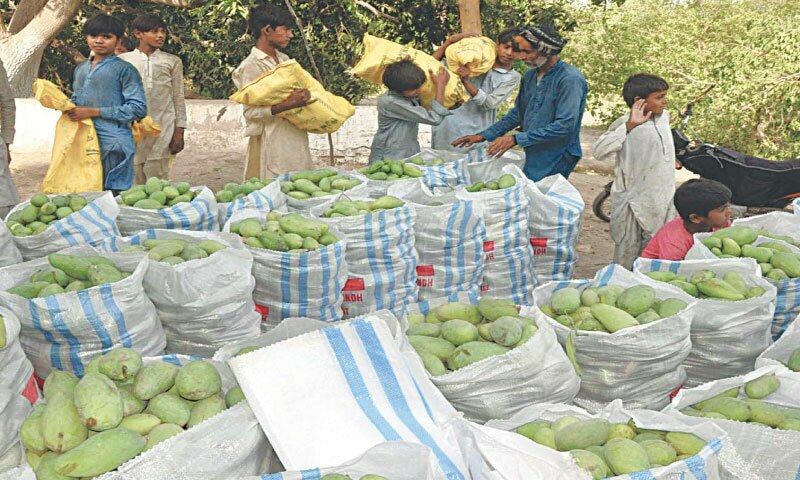Substantial damages are reported to mango crops as a result of wind storms in Hyderabad on May 3-4 in the Tando Allahyar and Mirpurkhas districts. This entire region is known for rich mango orchards. Powerful summer winds usually visit the region by the end of April or early May. These storms proved to be quite unfriendly for mango crops at a time when mango orchard contractors as well as owners had begun preparation to send some varieties to the fruit market in the beginning of May.
By the looks of it, this summer has not boded well for Sindh’s mango crop from day one. The fruit suffered initial losses due to water shortages which were further disrupted by massive pest attacks on the trees. Now, wind storms have undermined crop prospects.
The meteorological department had recorded the speed of the storms at 30 nautical miles, or 54 kilometres per hour, in Hyderabad on the night of May 3, followed by another the next morning in Mirpurkhas, where wind speeds were recorded at 28 nautical miles, or 52km per hour, as the storm drifted eastward in Mirpurkhas.
Wind storms caused the dropping of considerable unripe mangoes, locally known as kairi. Wholesale market dealers and orchard owners said losses in orchards are significant and led to the arrival of unripe-mango-laden vehicles in Hyderabad’s wholesale market in large numbers.
Orchard farmers and contractors brace for financial losses as wind storms further disrupt water-starved and pest-ridden mango crops
“Dozens of vehicles carrying kairi arrived following the storms, which is unusual in May. Otherwise, unripe mangoes take some time to be marketed,” said Asif Arain, a fruit trader in the wholesale market. He said that their arrival had crashed the market as prices plummeted to Rs300 to Rs400 per 50kg bag, which were Rs2,000 to Rs2,200 per 50kg before the storm hit.
These damages to unripe mangoes, according to Mirpurkhas-based mango producer Taha Memon, would translate into bigger monetary losses for him and other growers as fruit setting had reduced following pest attacks. “Actually, this malformation due to diseases is increasing, which is being attributed to climate change, and it is becoming increasingly troubling for us every season,” he said.
From the growers’ point of view, irrigation water supplies in early February and March are of essence, for this is the critical time when flowering starts converting into fruit setting in trees. “I used tube wells to irrigate the orchard in the absence of irrigation water supplies from the barrage. But my experience is that subsoil water is not a better substitute for canal water that carries silt and is beneficial for soil and trees,” said Mir Shah Mohammad from Tandojam, one of the worst storm-affected areas in the Hyderabad region.
Mr Mohammad opined that unripe mangoes remained undersized, and if this is the case in other orchards, then it is going to have a negative impact on export potential. Lower production is already being feared, he said.
Given the situation, mango orchard contractors have revoked their contracts unilaterally on the grounds that they would incur more financial losses if they continue with the contract; they believe they won’t be able to earn enough profit to recover their investment at the end of the day.
“Landlords promise they will cooperate with contractors, but most of them don’t. A contractor bears the loss and has to pay the committed amount even if he doesn’t get the necessary production,” said Haji Umar Daraz, who has multiple orchards on contract while confirming that storm-related damages are immense.
The contractual system is common among mango orchard owners, in which a contractor pays a fixed amount to the landlord to manage the orchard, harvest the fruit with labourers, and sell it. These contracts involve millions of rupees annually. Contractors are usually blamed for not making serious efforts to manage orchards. But orchard owners avoid handling this laborious job, too.
Mango orchards, by and large, are managed under conventional practices without government backing to promote innovation, research, and development at farms. “We have been told high-density mango farming is good and gives better yields with minimum losses of miscellaneous nature. But no such model orchard is created by the Sindh Horticulture Research Institute in Mirpurkhas, the oldest research body on mangos,” argued Mahmood Nawaz Shah, an orchard owner.
According to Mr Shah, mango producers are performing in a vacuum. Farmers themselves have taken initiatives to plant high-density mangoes without any institutional support, and such farming is capital intensive. Since it is a paradigm shift in mango farming, farmers have to wait for five to seven years to know whether it is any good.
Furthermore, Mr Shah agrees that the current landscape of orchards is not sustainable. “A mango festival has become an annual ritual which, to me, is a cosmetic exercise. It doesn’t benefit anyone. An ordinary orchard owner needs practical guidance about effective management of orchards to positively impact yields,” he contended.
In a high-density farm, up to 800 to 1,300 trees in an acre are recommended, as plant-to-plant spacing is reduced considerably when compared with 30-40 trees in an acre in a conventional farm. Nadeem Shah, a Matiari-based orchard owner, is one of the few farmers who had attempted high-density farming and gave it up. He explained that, considering the cost-benefit ratio, he could not keep high-density farms intact, as it involved expensive labour.
However, Ghulam Sarwar Abro’s experience with high-density farming is giving him good results where maximum trees in an acre offer greater yields than lesser, larger canopy trees in one acre. “Older trees ultimately face the natural ageing process as well, which compromises their yields,” he quipped.
Published in Dawn, The Business and Finance Weekly, May 12th, 2025


